November 1 to November 15 - abbey
Main menu:
- Home Page
- Abbey
- Apiary
- Documents
- Monastic
- Spirituality
- Apostleship of the Sea
- Homilies of Pope Francis
November 1 to November 15
Church does not pick and choose; it is a community that includes everyone
On Tuesday, November 5, at the morning’s mass Pope stressed that the Church does not pick and choose; it is a community that includes everyone. “Christianity is an invitation to the Lord’s feast in which we must ‘participate fully’ and with everyone. The Church does not pick and choose.”
The readings of the day mark the identity of the Christian. First of all, the Christian essence is an invitation: we only become Christians if we are invited. It is a ‘free invitation’ from God to participate. You can’t pay to get into the feast: either you are invited or you can’t come in. If in our conscience, we don’t have this certainty of being invited, then we haven’t understood what a Christian is.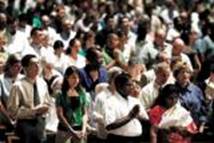 A Christian is one who is invited. Invited to what? To a shop? To take a walk? The Lord wants to tell us something more: You are invited to join in the feast, to the joy of being saved, to the joy of being redeemed, to the joy of sharing life with Christ. This is a joy! You are called to a party! A feast is a gathering of people who talk, laugh, celebrate, are happy together. I have never seen anyone party on their own. That would be boring, no? Opening the bottle of wine . . . That’s not a feast, it’s something else. You have to party with others, with the family, with friends, with those who’ve been invited, as I was invited. Being Christian means belonging, belonging to this body, to the people that have been invited to the feast: this is Christian belonging.
A Christian is one who is invited. Invited to what? To a shop? To take a walk? The Lord wants to tell us something more: You are invited to join in the feast, to the joy of being saved, to the joy of being redeemed, to the joy of sharing life with Christ. This is a joy! You are called to a party! A feast is a gathering of people who talk, laugh, celebrate, are happy together. I have never seen anyone party on their own. That would be boring, no? Opening the bottle of wine . . . That’s not a feast, it’s something else. You have to party with others, with the family, with friends, with those who’ve been invited, as I was invited. Being Christian means belonging, belonging to this body, to the people that have been invited to the feast: this is Christian belonging.
This feast is a ‘feast of unity.’ All are invited, the good and the bad. And the first to be invited are the marginalized, the poor, those who have strayed from the Church. The Church is not the Church only for good people. Do we want to describe who belongs to the Church, to this feast? The sinners. All of us sinners are invited. At this point there is a community that has diverse gifts: one has the gift of prophecy, another of ministry, another for teaching. . . We all have qualities and strengths. But each of us brings to the feast a common gift…
Each of us is called to participate fully in the feast. Christian existence cannot be understood without this participation. ‘I go to the feast, but I don’t go beyond the antechamber, because I want to be only with the three or four people that I familiar with. . .’ You can’t do this in the Church! You either participate fully or you remain outside. You can’t pick and choose: the Church is for everyone, beginning with those I’ve already mentioned, the most marginalized. It is everyone’s Church! Being invited to the feast means being active participants in a community along with everyone else. But in the Parable of the Great Banquet (Luke 14, 15:24), guests start to look for excuses not to go to the feast. There are Christians who are content to be on the guest list: chosen Christians. But, this is not sufficient, because if you don’t participate you are not a Christian. You were on the list, but this isn’t enough for salvation! This is the Church: to enter into the Church is a grace; to enter into the Church is an invitation.
To enter into the Church, is to become part of a community, the community of the Church. To enter into the Church is to participate in all the virtues, the qualities that the Lord has given us in our service of one for the other. To enter into the Church means to be responsible for those things that the Lord asks of us. Ultimately, to enter into the Church is to enter into this People of God, in its journey towards eternity. No one is the protagonist of the Church: but we have ONE, who has done everything. God is the protagonist! We are his followers . . . and he who does not follow Him is the one who excuses himself and does not go to the feast.”
God has a loving weakness for the lost sheep
Finding the lost sheep is a joy to God, because he has a ‘loving weakness’ for those who are lost. These were the words of Pope Francis during his homily at Mass on Thursday November 7.
Commenting on the parables of the lost sheep and of the lost coin, Pope Francis talked about the attitude of the scribes and the Pharisees, who were scandalised by the things that Jesus did. “They murmured against him: “This man is dangerous, he eats with the publicans and the sinners, he offends God, he desecrates the ministry of the prophet to accost these people.” Jesus says that this is the music of hypocrisy and answers this hypocrisy with a parable.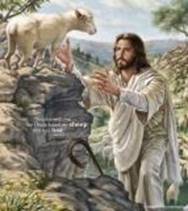 He replies to this murmuring with a joyful parable. The words ‘joy’ and ‘happiness’ appear in this short text four times: three times joy, and once happiness. “And you” – it’s as if he were saying – “you are scandalised by this, but my Father rejoices”. That is the most profound message of this story: the joy of God, a God who doesn’t like to lose. God is not a good loser, and this is why, in order not to lose, He goes out on his own, and He goes, He searches. He is a God who searches: He searches for all those who are far away from Him, like the shepherd who goes to search for the lost sheep. The work of God is to go and search, in order to invite everyone to the celebrations, good and bad.
He replies to this murmuring with a joyful parable. The words ‘joy’ and ‘happiness’ appear in this short text four times: three times joy, and once happiness. “And you” – it’s as if he were saying – “you are scandalised by this, but my Father rejoices”. That is the most profound message of this story: the joy of God, a God who doesn’t like to lose. God is not a good loser, and this is why, in order not to lose, He goes out on his own, and He goes, He searches. He is a God who searches: He searches for all those who are far away from Him, like the shepherd who goes to search for the lost sheep. The work of God is to go and search, in order to invite everyone to the celebrations, good and bad.
He can’t stand losing one of His own. And this is the prayer of Jesus, also on Holy Thursday: “Father, may none be lost, of those You have given to me.” He is a God who walks around searching for us, and has a certain loving weakness for those who are furthest away, who are lost. He goes and searches for them. And how does he search? He searches till the end, like the shepherd who goes out into the darkness, searching, until he finds the sheep. Or like the woman, when she loses a coin, who lights a lamp and sweeps the house, and searches carefully. That’s how God searches. “I won’t lose this son, he’s mine! And I don’t want to lose him.” This is our Father: he always comes searching for us.
Then, when he has found the sheep and brought it back into the fold with the others, no one must say ‘you are lost’, but everyone should say ‘you are one of us’, because this returns dignity to the lost sheep. There is no difference, because God returns to the fold everyone he finds. And when he does this, he is a God who rejoices.
The joy of God is not the death of the sinner, but the life of the sinner. And how far from this were those who murmured against Jesus, how far from the heart of God! They didn’t know Him. They thought that being religious, being good people meant always being well-
Dirty bread of corruption
In his homily at Mass Friday November 8, Pope Francis commented on the parable of the dishonest steward taken from the Gospel of St Luke (16:1-
“The Lord speaks to us again about the spirit of the world, about worldliness: how this worldliness works and how perilous it is. In his prayer after the Last Supper on Holy Thursday, Jesus besought the Father not to allow his disciples to fall into worldliness. Worldliness is the enemy, and the devil derives great pleasure from seeing us live according to his ways. He pointed to the dishonest steward described in the Gospel as an example of worldliness. Some of you might say: ‘But this man only did what everyone does!’. No, not everyone! Some company administrators, public administrators, government administrators … but perhaps not many. It’s an attitude of taking short cuts, of taking the easy road to earn a living”.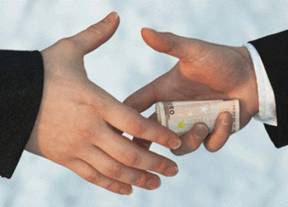 The master praises the dishonest steward in the Gospel. He is praising bribery. The habit of bribes and kickbacks is a worldly and extremely sinful habit.... God commanded us to bring home bread through honest work. Instead this steward was giving dirty bread to his children to eat. And his children, who perhaps were educated in expensive universities and were raised in very cultured circles, were fed dirt by their father. For in bringing home unclean bread, their father lost his dignity. And this is a grave sin. It might start with a small bribe, but it is like a drug.
The master praises the dishonest steward in the Gospel. He is praising bribery. The habit of bribes and kickbacks is a worldly and extremely sinful habit.... God commanded us to bring home bread through honest work. Instead this steward was giving dirty bread to his children to eat. And his children, who perhaps were educated in expensive universities and were raised in very cultured circles, were fed dirt by their father. For in bringing home unclean bread, their father lost his dignity. And this is a grave sin. It might start with a small bribe, but it is like a drug.
In fact, that it is a serious sin because it is so much against our dignity. That dignity by which we are united through our work... Not through bribes and kickbacks. Not through this addiction to worldly deceit. When we read in the papers or hear someone on the news speak about corruption, perhaps we think that corruption is just a word. This is corruption: not earning our daily bread with dignity. However, there is another road, an alternative route to worldly deceit. It is the path of ‘Christian ingenuity’. This path, allows us to be cunning but not according to the spirit of the world. Jesus himself said it: “be wise as serpents, innocent as doves”. Uniting these two realities is a grace and a gift of the Holy Spirit. This Christian ingenuity is a gift; it is a grace that the Lord gives to us. But we need to ask for it.
Pope Francis then turned his attention to the families of the world’s dishonest stewards. “Perhaps today, it would be good for all of us to pray for the many children who receive dirty bread from their parents, since they too are hungry; they are hungry for dignity.”
The Holy Father concluded by inviting all of those present “to ask the Lord to change the hearts of those who are devoted to the goddess of bribery in order that they might understand that dignity comes from noble work, from honest work, from daily work, and not from the easy road which in the end strips you of everything. For when they face death, these poor people who lose their dignity through the practice of bribery do not take with them the money they earned; they only take their lack of dignity. “Let us pray for them”.
Sinners yes, corrupt no…
“Sinners yes, corrupt no”. Pope Francis turned once again to the topic of corruption, or better, to the corrupt, whose ‘double lives’ he called a ‘varnished decay’ at the mass on Monday, November 11. The Pope based his homily on a passage taken from the Gospel: “If your brother sins, rebuke him, and if he repents, forgive him…” (cf. Lk 17:1-
The Pope based his homily on a passage taken from the Gospel: “If your brother sins, rebuke him, and if he repents, forgive him…” (cf. Lk 17:1-
“But what is the difference between sin and scandal? The difference is that whoever sins and repents asks for forgiveness, he feels weak, he sees himself as a child of God, he humbles himself and asks Jesus to save him. But the one who gives scandal and does not repent continues to sin and pretends to be a Christian. It is as though he leads “a double life.” The double life of a Christian causes great harm. For example someone who puts one hand in his pocket and shows that he helps the Church, while with the other hand he robs the State, and the poor. It would be better for such a person if a millstone where put around his neck and he be thrown into the sea, and it is not I who says it, but Jesus”.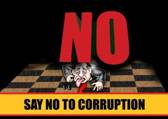 The day’s First Reading from the Book of Wisdom (1:1-
The day’s First Reading from the Book of Wisdom (1:1-
Those who are corrupt do not know what humility is. Jesus likens them to whitewashed tombs: they appear beautiful on the outside, but inside they are full of dead bones. And a Christian who boasts of being a Christian but does not lead a Christian life is corrupt. We all know such people, and we all know “how much harm corrupt Christians, and corrupt priests do to the Church. What harm they do to the Church! They do not live in the spirit of the Gospel, but in the spirit of worldliness. St Paul states it clearly to the Romans: Do not be conformed to this world (cf. Rom 12:2). However, it is even stronger in the original text: do not enter into this world’s schemes, into its framework, because this leads to a double life”.
Pope Francis concluded: “varnished decay: this is the life of someone who is corrupt. And Jesus does not call them simply sinners. He calls them hypocrites. And yet Jesus always forgives, he never tires of forgiving. The only thing he asks is that there be no desire to lead this double life. Let us ask the Lord for the grace to flee from every form of deceit and to see ourselves as sinners. Sinners yes, corrupt no”.
In the sure hands of God
In God’s hands we find our true security. They are hands wounded by love, and they guide us along the path of life. This was the heart of the homily Pope Francis delivered during the Mass on Tuesday, 12 November.
The Holy Father commented on the first Reading of the day, taken from the Book of Wisdom (2:23-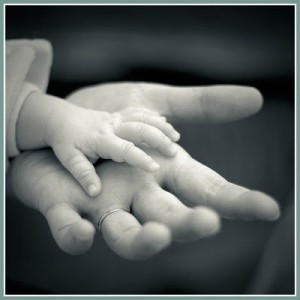 The devil envied the greatness and beauty of God’s rational creature, and through the devil’s envy, death entered the world. The devil could not endure that man be superior to him, that man and woman be made in the image and likeness of God. This is why he made war on them and laid before them a road that leads to death.
The devil envied the greatness and beauty of God’s rational creature, and through the devil’s envy, death entered the world. The devil could not endure that man be superior to him, that man and woman be made in the image and likeness of God. This is why he made war on them and laid before them a road that leads to death.
And yet the Lord does not abandon the work of his hands. The book of Wisdom says, “The souls of the just, are in the hands of God”. We all have to pass through death. Yet it is one thing to pass through this in the hands of the devil, and quite another to pass through it in the hands of God. I love to listen to these words: ‘we are in the hands of God.’ And this was so from the very beginning.
The Bible uses a beautiful image to explain our creation: God who with his hands forms us out of mud, out of the clay of the earth, into his image and likeness. It was God’s hands that fashioned us: God the artist”. And therefore, God does not abandon us. God, acts like a father with his child and takes him by the hand. God’s hands accompany us on our journey. The Father teaches us how to walk, how to travel on the road of life and salvation. And our Father caresses us, he loves us so much. And oftentimes in these caresses we also find forgiveness.
It does us great good to think: Jesus, God still bears his wounds. He shows them to the Father. This is the price: the hands of God are hands pierced by love. And this brings us great comfort. How many times have we heard it said: I don’t know whom to trust, all the doors are closed, I shall entrust myself to the hands of God! And this is beautiful, because it is there that we rest secure. Let us think about the hands of God, who fashioned us as an artist. He has given us eternal life. They are pierced hands. They accompany us along the path of life. Let us entrust ourselves to the hands of God as a child entrusts himself to his father”.
The spirit of wisdom triumphs over worldly curiosity
In his homily during Holy Mass on Thursday, 14 November, Pope Francis commented on the first Reading of the day, taken from the Book of Wisdom (7:22-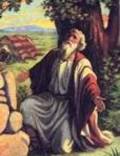 This wisdom, the Scriptures tell us, is ‘intelligent, holy, unique, manifold, subtle, mobile, clear.’ The Christian is called to journey through life in this spirit, in the spirit of God who assists and guides us in making decisions in accord with the heart of God. This spirit gives us peace, always; it is the spirit of peace, the spirit of love, the spirit of fraternity. This is what holiness is: It is what God asked of Abraham: “walk in my presence and be blameless in my sight.” It is a matter of coming under the influence and movement of God’s Spirit and of this wisdom. And we can say that the man and woman who journey thus are wise, for they move docilely under the motion of the patience of God.
This wisdom, the Scriptures tell us, is ‘intelligent, holy, unique, manifold, subtle, mobile, clear.’ The Christian is called to journey through life in this spirit, in the spirit of God who assists and guides us in making decisions in accord with the heart of God. This spirit gives us peace, always; it is the spirit of peace, the spirit of love, the spirit of fraternity. This is what holiness is: It is what God asked of Abraham: “walk in my presence and be blameless in my sight.” It is a matter of coming under the influence and movement of God’s Spirit and of this wisdom. And we can say that the man and woman who journey thus are wise, for they move docilely under the motion of the patience of God.
However, in the day’s Gospel passage from St Luke (17:20- Jesus tells us something quite interesting in this regard: this spirit of curiosity, which is worldly, leads us into confusion. In the Gospel he says: “the days are coming when you will desire to see one of the days of the Son of man, and you will not see it. And they will say to you, ‘Lo, there! or ‘Lo, here!’ ... It is curiosity that leads us to listen to these things. They tell us: the Lord is here, he is there, and there! “But I know a visionary, a visionary who receives messages from Our Lady.” To which the Pope added: “Look, Our Lady is a Mother and she loves us all. But she is not a post woman who sends messages every day.”
Jesus tells us something quite interesting in this regard: this spirit of curiosity, which is worldly, leads us into confusion. In the Gospel he says: “the days are coming when you will desire to see one of the days of the Son of man, and you will not see it. And they will say to you, ‘Lo, there! or ‘Lo, here!’ ... It is curiosity that leads us to listen to these things. They tell us: the Lord is here, he is there, and there! “But I know a visionary, a visionary who receives messages from Our Lady.” To which the Pope added: “Look, Our Lady is a Mother and she loves us all. But she is not a post woman who sends messages every day.”
In reality, these novelties draw us away from the Gospel, from wisdom, from the glory of God, from the beauty of God. And Jesus says that the kingdom of God does not come in a way that attracts attention. Rather, it comes through wisdom. The kingdom of God is in your midst, and the kingdom of God is this work, this action of the Holy Spirit who gives us wisdom, who gives us peace. The kingdom of God does not come in confusion, just as God spoke to the prophet Elijah neither in the strong wind nor in the earthquake nor in the fire, but rather in a still soft breeze. The breeze was the whisper of wisdom.
Little Thérèse said that she had to stop herself when faced with the spirit of curiosity. When she was speaking with another sister and this sister was telling a story, something about her family, about people. Sometimes the conversation would turn to another topic and she wanted to know the end of the story. But she sensed that this was not of the spirit of God, since it was a spirit of dissipation, of curiosity. The kingdom of God is in our midst. Do not seek strange things, do not look for novelties with worldly curiosity. Rather, let us allow the Spirit to lead us forward with the wisdom of a soft breeze. This is the spirit of the kingdom of God of which Jesus speaks.